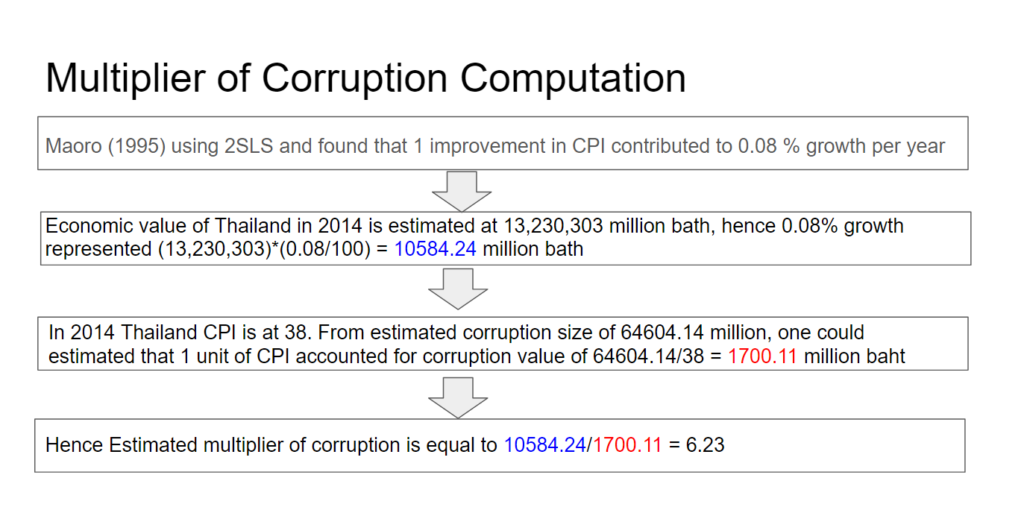Cover photo: “Corruption” by Pixabay from Pexels
Volume 3 Number 5 : November 2019| Article
Corruption is one of the major issues that prohibited Thailand’s development. It is mostly driven by extractive institution that established within the society long ago. However, corruption is mostly viewed as the problems rather than certain kind of services where individual pays money to get premiums treat above the rule of laws. Based on that perspective, enforcing solutions mostly associated with promoting ethical issues, which seems to be quiet ineffective. Recently professor Thanee offered the new way of viewing this issue, and a way that one could help design a solutions together. The viewpoint on corruption as one highly efficient competitive markets.
Measuring corruption in Thailand should be Based on Perception
Corruption is like “love”, untouchable but you know it existed. Trying to measure the corruption is like asking “how much do you love me?”, and it is very hard to find appropriate measure on it. Hence measure corruption through the government’s tools to fight corruption is not an appropriate way. Instead of that one should measured through the perception of people within certain society, since people perception should able to captured whether corruption in the society improved or not. Hence CPI (corruption perception index) is one of the most acceptable tools in this academic field when it come to measuring corruption, which CPI based its calculation on fours measure of corruption including bribery fraud, budget misallocation, power distortions and assets misappropriation.
Role of corruption in Thailand’s market and Size of Corruption Market
In Thailand, corruption can be viewed as a middle man services serves to connected mostly between corporation and government. Based on Pasuk’s research in 2014, most of corruption is not occured from the household but mostly through cooperation and businessman. She addressed that the size of bribery fraud in 2014 is estimated at 4.944 billion bath. Moreover, Prof Thanee’s research in 2019 also shows that the estimated size of budget miss allocation of Thailand in 2014 is estimated to be around 60 billion bath. Although most data on power distortions and asset misappropriation is lacking in Thailand, if one combined the size of corruption based on only bribery fraud and budget misallocation, one could observed that the size of Thailand’s corruption in 2014 is roughly equal to 64.6 billions bath. In terms of scale comparison, if we counted corruption as one services sector and combined that to economy, one could see that it can potentially ranked at 16th, which equivalence to middle size industry of Thailand.

Corruption Multiplier is Extremely Large
Using the same method as Mauro and Paolo had done in 1995, as they analyze how the change in CPI could affect economic growth using 2SLS model(two stage least square). Prof. Thanee then estimated that multiplier for corruption in Thailand would equal to 6.23, which meant that reducing corruption in Thailand by 1 bath, would result in positive GDP contribution by 6.23 bath. This number is extremely large, and professor Thanee addressed 3 reasons for such large multiplier. Firstly it suggested that we are currently underestimating the corruption value, secondly corruption have potential to reduced multiplier on consumption investment and government spending and lastly the use of corruption money is considered inefficient as its either stay in form of transfer waiting, unproductive collection and consuming abroad.

Corruption Market in Thailand is getting stronger overtime
As mentioned before that conducting corruption measure should be done through measuring the people’s perception. Professor Thanee research in 2019 conducted a survey response. Although the actual raw data is too long to put within this article, Professor Thanee come up with certain conclusion based on his survey data. Firstly Corruption market in Thailand is becoming more privatized overtime. The data from Professor Pasuk’s shows that there is a significant decline in bribery fraud of Thai customs from 1999 to 2014. However, the perception measure on corruption on Thai customs bribery fraud is not falling at all. The fallen number is addressed by Professor Thanee, as he explained from his finding that these money goes into the hand of privatized entities like corporate shipping company. The customers (buyer of corruption) would use these corporate as a middle man to privately dealt with these government agencies by themselves. Secondly Professor Thanee founded that corruption in Thailand is like a MLM (multi-level marketing) business model, where the seller of corruption need to shares these corrupted income to the persons whose rank is above and below them within their chain. The third facts he founded is that corruption service in Thailand have an extremely strong customer satisfactory. Buyers of corruption services really satisfy with the time they could able to saved from dealing with various messy documents. And lastly, he founded that corruption institution is merging both in terms of vertical integration and horizontal integration toward similar groups of people. Based on this conclusion, Professor Thanee founded that the market for corruption in Thailand is extremely efficient, expanding, privatizing and becoming stronger overtime, which is not a good sign.
Do the opposite of what Economist is doing
A way of solving corruption in Thailand is an opposite of what economist trying to do, instead of making the market become efficient, dealing with corruption markets in Thailand turn out to be thinking about designing a mechanism to “de-efficient” the market in a sense that trying to push the cost of corruption to become so high such that it surpassed the benefit of committing it. Whether through legal enforcement, pushing more democracy, political reform, and etc. would be a challenging question for further discussion, and it is all our duty to de-efficient it together.
Reference
Mauro, Paolo (1995) “Corruption and Growth” The Quarterly Journal of Economics, Vol. 110, No. 3 (Aug.), pp. 681-712. Retrieved from: http://homepage.ntu.edu.tw/~kslin/macro2009/Mauro%201995.pdf
Phasuk pongpaijit, Yongyuth Chaiyapong and Thanee Chaiwat (2014) “คอร์รัปชันในระบบราชการไทย การสำรวจ ทัศนคติประสบการณ์ของหัวหน้าครัวเรือน” สนับสนุนโดยสำนักงานกองทุนสนับสนุนการวิจัย (สกว.).
Phasuk pongpaijit, Nualnoi Treerat, Yongyuth Chaiyapong and Chris Baker (2000) “คอร์รัปชันในภาครัฐ: ความเห็นและประสบการณ์ของครัวเรือน” สนับสนุนโดยสำนักงานคณะกรรมการข้าราชการพลเรือน (สำนักงาน ก.พ.)
Thanee Chaiwat (2019) “เมื่อกฏหมาย(ขาย)ได้ ตลาดกาารแข่งขันคอรัปชั่นในประเทศไทย” Pier Research Institute Retreived From:https://www.pier.or.th/wp-content/uploads/2019/09/paper6_paper_Thanee.pdf











































